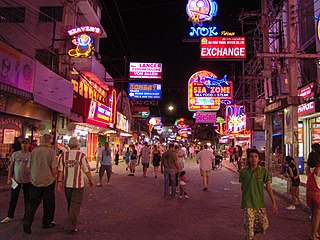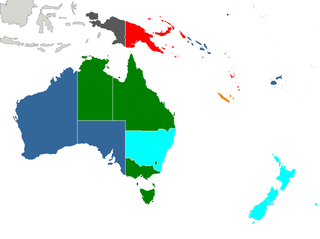Related Research Articles

A massage parlor, or massage parlour, is a place where massage services are provided. Some massage parlors are front organizations for prostitution and the term "massage parlor" has also become a euphemism for a brothel.

Prostitution in Thailand is illegal. However, due to police corruption and an economic reliance on prostitution dating back to the Vietnam War, it remains a significant presence in the country. It results from poverty, low levels of education and a lack of employment in rural areas. Prostitutes mostly come from the northeastern (Isan) region of Thailand, from ethnic minorities or from neighbouring countries, especially Cambodia, Myanmar, and Laos. In 2019, UNAIDS estimated the total population of sex workers in Thailand to be 43,000.
Prostitution in the Philippines is illegal, although somewhat tolerated, with law enforcement being rare with regards to sex workers. Penalties range up to life imprisonment for those involved in trafficking, which is covered by the Anti-Trafficking in Persons Act of 2003. Prostitution is available through bars, karaoke bars, massage parlors, brothels, street walkers, and escort services.
Prostitution in Jamaica is illegal but widely tolerated, especially in tourist areas. UNAIDS estimate there to be 18,696 prostitutes in the country.
Prostitution in Senegal is legal and regulated. Senegal has the distinction of being one of the few countries in Africa to legalize prostitution, and the only one to legally regulate it. The only condition that it is done discreetly. Prostitution was first legalised in 1966. UNAIDS estimate that there are over 20,000 prostitutes in the country. The average age for a sex worker in Senegal is 28 years old and female.
Prostitution in Georgia is illegal but widespread, particularly in the capital, Tbilisi. Many NGO's attribute this to the harsh economic conditions according to the US State Department. Prostitution occurs on the streets, in bars, nightclubs, hotels and brothels. UNAIDS estimate there are 6,525 prostitutes in Georgia.
Prostitution in Yemen is illegal and punishable by penalty from 3 years of prison to even death penalty but common especially in Aden and in the capital, Sana'a. UNAIDS estimate there are 54,000 prostitutes in the country. Many of these women have turned to prostitution because of poverty. Many are Ethiopian and Somali refugees.
Prostitution in Zambia is legal and common. Related activities such as soliciting and procuring are prohibited. UNAIDS estimate there are 9,285 prostitutes in the capital, Lusaka. Many women turn to prostitution due to poverty. Sex workers report law enforcement is corrupt, inconsistent and often abusive.
Prostitution in Indonesia is legally considered a "crime against decency/morality", although it is widely practiced, tolerated and even regulated in some areas. Some women are financially motivated to become prostitutes, while others may be forced by friends, relatives or strangers. Traditionally, they have met with customers in entertainment venues or special prostitution complexes, or lokalisasi (localization). However, recently internet forums and Facebook have been used to facilitate prostitute-client relations. In recent years, child sex tourism has become an issue at the resort islands of Batam and Bali.
Jamaica is a source, transit, and destination country for adults and children trafficked for the purposes of sexual exploitation and forced labor.
The Macau Special Administrative Region (MSAR) of the People’s Republic of China is primarily a destination, and to a much lesser extent, a source territory for women and children subjected to trafficking in persons, specifically commercial sexual exploitation. Victims are primarily from the Chinese mainland, Mongolia, Russia, and Southeast Asia, with many of them from inland Chinese provinces who travel to the border province of Guangdong in search of better employment. There, they fall prey to false advertisements for jobs in casinos and other legitimate employment in Macau, but upon arrival, they are forced into prostitution. Foreign and mainland Chinese women are sometimes passed to local organized crime groups upon arrival, held captive, and forced into sexual servitude. Chinese, Russian, and Thai criminal syndicates are believed to sometimes be involved in bringing women into Macau’s commercial sex industry. Victims are sometimes confined in massage parlors and illegal brothels, where they are closely monitored, forced to work long hours, have their identity documents confiscated, and threatened with violence; all factors that make it particularly difficult for them to seek help. Macau is a source territory for women and girls who are subjected to forced prostitution elsewhere in Asia.
Mongolia is a source country, and to a much lesser extent, a destination for men, women, and children who are subjected to trafficking in persons, specifically forced prostitution and forced labor. Mongolian men, women, and children are found in these conditions in China, Macau, Malaysia, South Korea, and Hong Kong. Mongolian men and women have been found in conditions of forced labor in Turkey, Kazakhstan, and the Czech Republic. Visa-free travel of Mongolians to Turkey has resulted in a significant increase in the number of both labor and sex trafficking cases of Mongolian labor migrants in Turkey. There remain concerns about involuntary child labor in the Mongolian construction, mining, and industrial sectors, where children are vulnerable to injury and face severe health hazards. The problem of Mongolian women subjected to conditions of involuntary servitude after engaging in brokered marriages – mainly to South Korean men – continues. Trafficking within Mongolia often involves women and girls forced to work in saunas or massage parlors where they are subjected to forced prostitution. Anecdotal reports continue to indicate that South Korean and Japanese tourists engage in child sex tourism in Mongolia.
Prostitution in East Timor is legal, but soliciting and third party involvement for profit or to facilitate prostitution is forbidden. Prostitution has become a problem since the country gained independence from Indonesia in 2002, especially in the capital, Dili. There are estimated to be 1,688 sex workers in the country.
Prostitution in Madagascar is legal, and common, especially in tourist areas. Related activities such as soliciting, procuring, living off the earnings of prostitution or keeping a brothel are prohibited. Public Order laws are also used against prostitutes. There are recent laws against "consorting with female prostitutes". People caught paying for sex with children under 14 can face criminal penalties of up to 10 years imprisonment. This is strictly enforced against foreign tourists. As well as in the tourist areas, prostitution also occurs around the mining towns of the interior such as Ilakaka and Andilamena. It was estimated that there were 167,443 sex workers in the country in 2014.
Prostitution in Niger is illegal but common in the cities, near mines and around military bases. UNAIDS estimate there are 46,630 sex workers in the country. Many have turned to prostitution because of poverty.
Prostitution in Angola is illegal and prevalent since the 1990s. Prostitution increased further at the end of the civil war in 2001. Prohibition is not consistently enforced. Many women engage in prostitution due to poverty. It was estimated in 2013 that there were about 33,00 sex workers in the country. Many Namibian women enter the country illegally, often via the border municipality of Curoca, and travel to towns such as Ondjiva, Lubango and Luanda to work as prostitutes.

Prostitution is legal in Macau unlike in mainland China, because the city is a special administrative region of the country. However, operating a brothel and procuring are both illegal in Macau, with the latter punishable by a maximum jail sentence of 8 years. Street prostitution is illegal but sex work in a massage parlor is considered to be de facto legal. The city has a large sex trade despite there being no official red-light district. In addition to street prostitution, prostitutes work in low-rent buildings, massage parlours and illegal brothels, and the casinos, nightclubs, saunas and some of the larger hotels. Most hotels, however, have suspected prostitutes removed from the premises. Many of the city's sidewalks and underpasses are littered with prostitutes' calling cards.

Prostitution in Oceania varies greatly across the region. In American Samoa, for instance, prostitution is illegal, whereas in New Zealand most aspects of the trade are decriminalised.

Sexual slavery in China is sexual exploitation and slavery that occurs in the People's Republic of China.

Sex trafficking in Mongolia is human trafficking for the purpose of sexual exploitation and slavery that occurs in the country. Mongolia is a source, transit and destination country for sexually trafficked persons.
References
- ↑ "Sex Work Law - Countries". Sexuality, Poverty and Law.
- 1 2 "The Legal Status of Prostitution by Country". ChartsBin. Retrieved 27 January 2018.
- 1 2 3 4 5 6 7 8 "Mongolia mining success brings booming sex trade". Arabs Today (in European Spanish). 11 July 2011. Retrieved 27 January 2018.
- ↑ "Analysis of the Situation of Children in Mongolia 2014" (PDF). UNICEF . Retrieved 27 January 2018.
- 1 2 3 4 5 6 7 "Mongolia 2017 Trafficking in Persons Report". U.S. Department of State. Archived from the original on 3 July 2017. Retrieved 27 January 2018.
 This article incorporates text from this source, which is in the public domain .
This article incorporates text from this source, which is in the public domain . - 1 2 "Executive summary Mongolia" (PDF). ECPAT. Retrieved 27 January 2018.
- ↑ "Active syphilis among sex workers - Percent, 2016". www.aidsinfoonline.org. UNAIDS. Archived from the original on 23 July 2018. Retrieved 22 July 2018.
- ↑ "Mongolia". Trafficking in Persons Report 2010. U.S. Department of State (June 14, 2010).
 This article incorporates text from this source, which is in the public domain .
This article incorporates text from this source, which is in the public domain . - ↑ "Mongolia 2018 Trafficking in Persons Report". U.S. Department of State. Archived from the original on 29 July 2018. Retrieved 29 July 2018.
